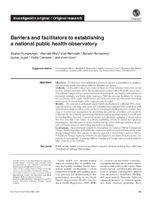Barriers and facilitators to establishing a national public health observatory
Date
2015Author
Metadata
Show full item recordAbstract
Objective. To determine what stakeholders perceive as barriers and facilitators to creating a national public health observatory (PHO) in Trinidad and Tobago. Methods. A descriptive study was conducted based on 15 key informant interviews carried out from April to September 2013. The key informants worked within the health care sector in Trinidad and Tobago. Using a semi-structured interview guide, information was collected on knowledge, attitudes, and beliefs about creating a PHO; barriers and facilitators to creating and sustaining a PHO; legal considerations; and human resource and information technology requirements. Common themes of the responses were identified. Results. The majority of participants supported the development of a national PHO, recognized its value in informing their work, and indicated that a national PHO could 1) provide information to support evidence-informed decision-making for health policy and strategic planning; 2) facilitate data management by establishing data policies, procedures, and standards; 3) increase the use of data by synthesizing and disseminating information; and 4) provide data for benchmarking. However, a number of barriers were identified, including 1) the perception that data collection is not valued; 2) untimely availability of data; 3) limited data synthesis, dissemination, and utilization to inform decision-making; and 4) challenges related to the allocation of human resources and existing information technology. Conclusions. Key informants support the development of a national PHO in Trinidad and Tobago. The findings align well within the components of the conceptual framework for establishing national health observatories. A stepwise approach to establishing a national PHO in Trinidad and Tobago, beginning with structural components and followed by functional components, is recommended. A national PHO in Trinidad and Tobago could serve as a model for other countries in the Caribbean. Objetivo. Determinar las barreras y los facilitadores percibidos por los interesados directos para crear un observatorio de salud pública (OSP) nacional en Trinidad y Tabago. Métodos. Se realizó un estudio descriptivo basado en 15 entrevistas a informants clave llevadas a cabo de abril a septiembre del 2013. Los informantes clave trabajaban en el sector de la atención de la salud en Trinidad y Tabago. Mediante el empleo de una guía de entrevista semiestructurada, se recopiló información sobre conocimientos, actitudes y creencias acerca de la creación de un OSP; barreras y facilitadores para crear y mantener un OSP; consideraciones legales; y necesidades en cuanto a recursos humanos y tecnología de la información. Se determinaron los temas comunes de las respuestas. Resultados. La mayor parte de los participantes brindaron apoyo a la creación de un OSP nacional, reconocieron su valor para fundamentar su trabajo e indicaron que un OSP nacional podría 1) suministrar información para brindar apoyo a la toma de decisiones basada en la evidencia a efectos de política sanitaria y planificación estratégica; 2) facilitar el manejo de datos mediante el establecimiento de políticas, procedimientos y estándares de datos; 3) incrementar la utilización de los datos mediante la síntesis y la difusión de la información; y 4) proporcionar datos para la evaluación comparativa. Sin embargo, se indicaron varias barreras, incluidas 1) la percepción de que la recopilación de datos no se evalúa; 2) la inoportunidad de la disponibilidad de los datos; 3) las limitaciones en la síntesis, difusión y utilización de los datos para fundamentar la toma de decisiones; y 4) las dificultades relacionadas con la asignación de recursos humanos y de la tecnología de la información existente. Conclusiones. Los informantes clave brindan apoyo al desarrollo de un OSP nacional en Trinidad y Tabago. Los resultados se alinean bien dentro de los componentes del marco conceptual para establecer observatorios de salud nacionales. Se recomienda un método progresivo para establecer un OSP nacional en Trinidad y Tabago, empezando por los componentes estructurales y siguiendo con los componentes funcionales. Un OSP nacional en Trinidad y Tabago podría servir de modelo para otros países del Caribe.
Translated title
Barreras y facilitadores para el establecimiento de un observatorio de salud pública nacional
Subject
Citation
Pooransingh S, Misir A, Ramdath D, Ramsewak S, Jaglal S, Cameron C, Goel V. Barriers and facilitators to establishing a national public health observatory. Rev Panam Salud Publica. 2015;38(5):403-9.
Collections
Related items
Showing items related by title, author, creator and subject.
-
Rose, Angela M.; Hambleton, Ian R.; Jeyaseelan, Selvi M.; Howitt, Christina; Harewood, Rhea; Campbell, Jacqueline; Martelly, Tanya N.; Blackman, Tracey; George, Kenneth S.; Hassell, Trevor A.; Corbin, David O.; Delice, Rudolph; Prussia, Patsy; Legetic, Branka; Hennis, Anselm J. (2016)Objective. To describe the surveillance model used to develop the first national, populationbased, multiple noncommunicable disease (NCD) registry in the Caribbean (one of the first of its kind worldwide); registry ...
-
Roach, Allana; Warner, Wayne A.; Llanos, Adana A. M. (2015)Advances in human genetics and genomic sciences and the corresponding explosion of biomedical technologies have deepened current understanding of human health and revolutionized medicine. In developed nations, this has led ...
-
Doon, Rohit; Malcolm, Taraleen; Lewis, Yvonne; Holder, Latifah; Gulston, LaDonna; Hamid, Abdul; Best, Allana; Mitchell, Roxanne; Lalla, Pedram (2022)[ABSTRACT]. This article describes the introduction of the Pan American Health Organization’s HEARTS in the Americas program in Trinidad and Tobago and the successful experiences and challenges encountered in introducing ...




